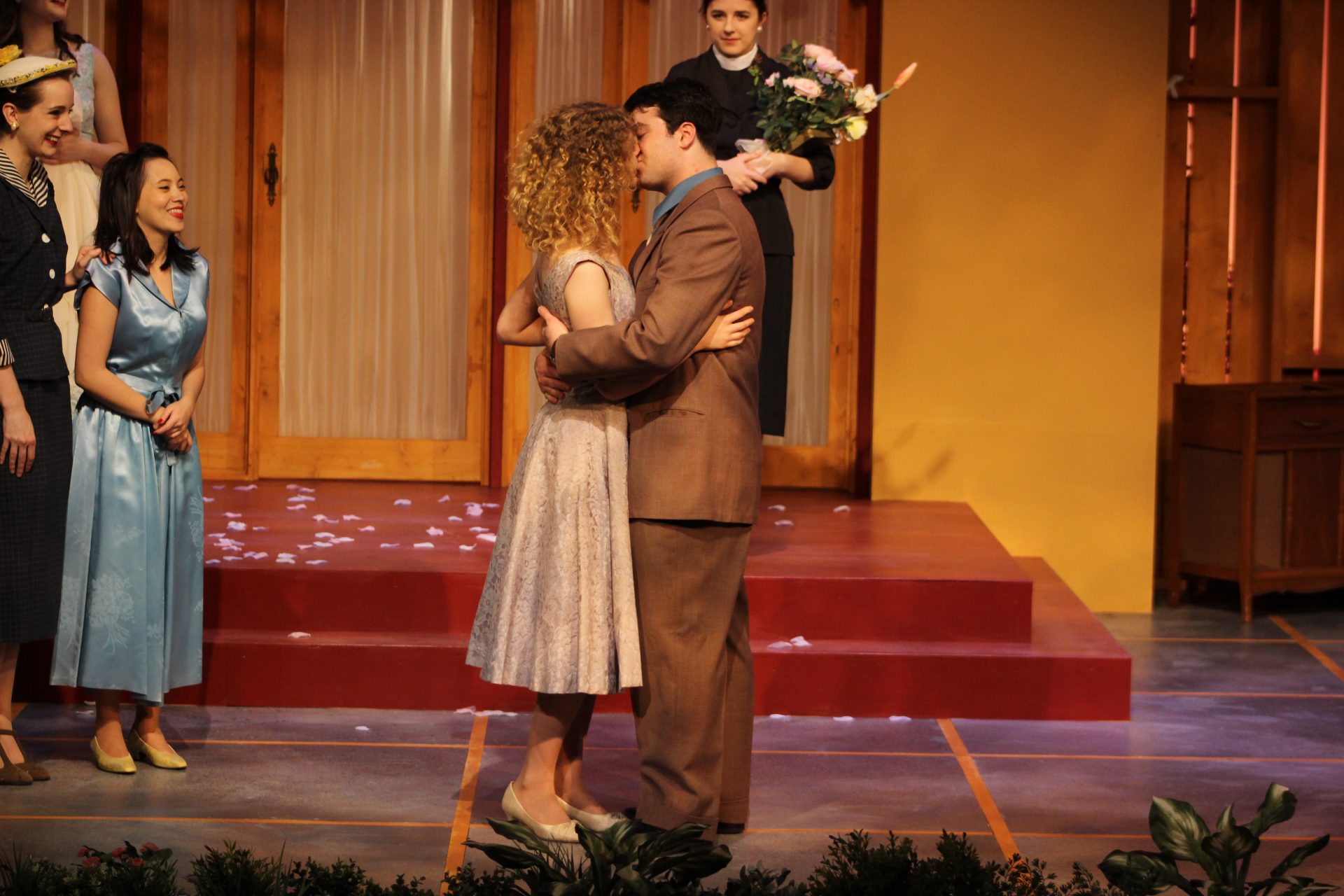
Lewis & Clark’s mainstage production of Shakespeare’s “Much Ado About Nothing” is an enjoyable 1940’s twist on the classic romantic comedy, but with strong undercurrents of real societal problems. Set at the end of World War II, the return a triumphant battalion of American soldiers sets the plot in motion at Leonata’s (Hannah Prutton) house. Captain Pedro, played by Thomas McAulay, and his men, take part in the reverie at Leonata’s home, hosted and attended by women who had taken over jobs for men during the war. Hero (played earnestly by Kalea Lee-Fleischmann), Leonata’s daugher and Claudio, played by Hunter Scribner, fall in love, and begin a courtship with the help of Pedro. Their romance has a foil, however, in Joan, Pedro’s sister (played with bitter intensity by Laurel Galaty). She is an anti-war activist who hates soldiers and seeks to ruin Claudio’s relationship. At the same time, Sergeant Benedick (Sam Gensler) and Leonata’s niece, Beatrice (Brynn Rova), engage in a witty flirtation, with both Gensler and Rova portray this relationship with perfectly timing and brutal honesty. Comedy ensues, as the characters all try to find their place in this new, post-war, world.
The set, built by LC students, evokes an idyllic and suburban atmosphere. Leonata’s backyard is the classic stereotype of the 1940’s: well-kept lawn, folding chairs, and plenty of patriotic accents. The stage is lit naturally; as day moves into night, the scene darkens from sunny blues to deeper sunset tones. Occasionally it deviates from natural lighting, in order to accent certain characters, but overall the immersion is complete. The beautiful costumes, assembled by Ashton Hull, serve a dual purpose of highlighting the designs of the time and also by setting several dichotomies within the play. The first is between the soldiers and the civilians. These men are almost always in their forest green uniforms, whereas the women wear bright and beautiful dresses. A second dichotomy is between most of the women and Joan and Beatrice. Every woman wears a dress, except for those two. Their more masculine attire accentuates their refusal of classic gender roles: Joan is an outspoken activist, only twenty years after women had earned the right to vote and were still fighting a system that tells them to sit down and shut up, and Beatrice has fallen in love with the freedom that the workplace gives her, and thus wears Rosie the Riveter-esque jeans, workshirt, and bandana for most of the show
The societal subtext in Much Ado About Nothing is impressively achieved through commentaries on gender, war, and the often conflictual relationship between freedom and patriotism. Though there are moments of pure comedy, especially the scenes with the local civilian safety patrol crew (Nicholas Brittain, Ashley Pio, Dylan Hankins, and Taylor Walters serve up slapstick and verbal comedy with delivery reminiscent of the Marx Brothers), there is an undeniable societal commentary. Hero and Beatrice set up a beautiful pairing of women: one who wants to settle down and live an idyllic life, and one who has had a taste of freedom and doesn’t want to go back to her previous way of life. The play takes care to not make a judgment call on which lifestyle is better, but lets the audience decide which they would prefer. There is a beautiful acknowledgment of the terrible effects of PTSD on the soldiers (a balloon is accidentally popped and the soldiers react), but that theme could have been developed better. Finally, the brilliance of setting Much Ado About Nothing right after World War II is that it gives a proper motivation to Joan. Originally written as Don John, the bastard brother of Pedro, John has very little motivation other than being upset at his status as the illegitimate brother of a war hero, which is no longer considered a black mark on your soul as it was when Shakespeare was writing. Director Stephen Week’s choice to change the character’s gender and make her an anti-war activist gives her motivation to hate the soldiers. It also adds subtext to some of her lines, especially when she says, “If I had my liberty, I would do my liking.” World War II was all about bringing liberty to Nazi-occupied Europe, yet was the US any more free? For activists like Joan, or, for that matter, Japanese-Americans, maybe not. It is up for the audience to decide for themselves who is right, who is wrong, or if the truth is somewhere in between.
Much Ado is two plays in one: a lighthearted romantic comedy and a commentary on how soldiers and civilians deal with the aftermath of the war within a changing world. While a daunting task, the show manages to balance the two without compromising the integrity of either part. As an audience member, nothing is more satisfying.
Much Ado About Nothing plays in Fir Acres Theatre Main Stage, October 28, 29, and November 3, 4, 5 – 7:30 pm, and October 30 matinee – 2:00 pm.
Subscribe to the Mossy Log Newsletter
Stay up to date with the goings-on at Lewis & Clark! Get the top stories or your favorite section delivered to your inbox whenever we release a new issue.

Leave a Reply